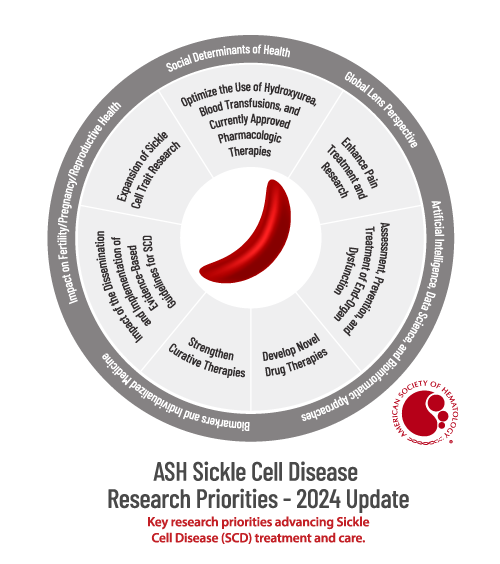ASH SICKLE CELL DISEASE RESEARCH PRIORITIES
The American Society of Hematology (ASH) has recently updated its Sickle Cell Disease (SCD) Research Priorities, reflecting advancements made over the past five years. These updates will serve as a crucial guide for SCD researchers over the next five years. The research listed includes remaining unaddressed questions and specific research topics that could push toward the goal of curing SCD. The priorities are not listed in rank order.
ASH encourages the Sickle Cell Disease (SCD) stakeholder community to adopt multidisciplinary strategies to advance these critical areas. By embracing a collaborative approach, advancements can be delivered to patients more quickly, cost-effectively, and efficiently to help alleviate the burden of Sickle Cell Disease.

Research Priorities by Topic
- Develop and expand prospective longitudinal studies with regular collection of biomarkers to understand the risk and progression of organ dysfunction in people with SCD.
- Integrate information on SCD phenotypes and omics along with environmental factors to help researchers develop new approaches to risk stratification and mitigation for SCD complications.
- Understand the mechanisms of acute and chronic SCD pain, from biochemical to cognitive and social, to develop mechanism-based treatments that both prevent and treat SCD pain.
- Identify biomarkers that predict pain before it starts and facilitate understanding of mechanisms when pain occurs. Use biomarkers to more precisely diagnose SCD pain phenotypes and evaluate therapies by their fundamental mechanisms; with improvement in patient-reported pain as the primary outcome.
- Focus on how providers can select the appropriate medications and doses for individuals with SCD while accounting for variables such as SCD genotype, age, and other chronic SCD comorbidities.
- Study how to best utilize and combine new and existing therapies to optimize outcomes for individuals with SCD.
- Understand how to utilize disease modifying therapies various SCD genotypes (e.g., in HbSC and other less common genotypes); special populations (e.g., pregnant persons); and those living in low- and middle-income countries.
- Focus on improving the approach to medication adherence to allow for optimal effectiveness of existing therapies.
- Increase understanding and risk stratification to prevent short- and long-term complications of blood transfusions.
- Expand efforts to develop novel and affordable drugs that directly inhibit sickle hemoglobin polymerization and downstream organ-specific damage.
- Create new animal and in vitro cell models and modern techniques for SCD drug development.
- Develop combination therapeutics for SCD.
- Develop innovative research and clinical trial designs and establish robust longitudinal registries for SCD to enhance drug development efforts and evaluate long-term efficacy.
- Continue investment in exploring and developing the different approaches to partial matched transplant.
- Support the diversity of gene therapies under development to create better outcomes.
- Understand how curative therapies impact organs affected by sickle cell disease to develop guidelines for patients and providers.
- Prioritize strategies to eliminate chemotherapy from the conditioning regimen of curative therapies to make them safer and more accessible.
- Dissemination and implementation research studies are needed to expedite the uptake of evidence-based therapy and care delivery across variable settings.
- Create guidelines for people with SCD living in low- and middle-income countries and lead culturally relevant implementation research.
- Create comprehensive animal and laboratory models to better understand the pathophysiology and modifiers of SCT-associated complications.
- Determine biomarkers and genetic/environmental modifiers of complications with large cohort studies.
- Address reproductive and genetic counseling for SCT through community-based participatory research.
Related Efforts to Support SCD Research
The ASH Center for Sickle Cell Disease Initiatives houses programs that advance research, create SCD resources, and advocate for legislation. In addition, its global coalitions help researchers connect across institutions, countries, and career stages.
- ASH Center for Sickle Cell Disease Initiatives
- ASH Research Collaborative
- Consortium on Newborn Screening in Africa (CONSA)
- Sickle Cell Disease Coalition
Other ASH Resources
- ASH Agenda for Hematology Research
- Hematology-Focused Fellowship Training Program Consortium (HFFTP)
- ASH SCD Away Elective
- ASH SCD Centers Workshop
- ASH Advocacy for Sickle Cell Disease
Acknowledgements
ASH sincerely thanks the co-chairs of the SCD Research Priorities Working Group, Drs. Amanda Brandow and Betty S. Pace, along with all Working Group Leaders and team members. Your expertise and contributions were essential in identifying the top priorities for the next five years, and we are deeply grateful for your efforts.
- Assessment, Prevention and Treatment of End-Organ Dysfunction
- Enhance Pain Treatment and Research
- Optimize the Use of Hydroxyurea, Blood Transfusions, and Currently Approved Pharmacologic Therapies
- Develop Novel Drug Therapies
- Strengthen Curative Therapies
- Impact of the Dissemination and Implementation of Evidence Based Guidelines for SCD
- Expansion of Sickle Cell Trait Research
- Advancing Fundamental Knowledge to Enable Improved Approaches to Sickle Cell Disease